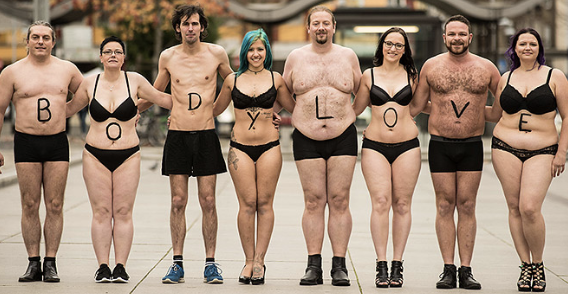The harmful nature of diet culture

“Diet culture is a set of beliefs revolving around the idea that “thin” bodies are the most desirable, valuable and “healthy.” Diet culture also conveys that eating a certain way is “good” or “bad”—and that a person’s worth increases when eating “healthy,” or when living in a small body.
We have all heard of this culture. As teenagers we are some of the most high risk individuals to fall for it. We are told to join sports, eat well and stay healthy no matter what. But this is more harmful than it may seem.
Statistically 1.6 percent of high school students will get an ED before they get their driver’s license. To really look into how diet culture has affected our community. Students were asked the following questions in a survey on Schoology:
- Have you ever experienced body dysphoria. a mental illness involving obsessive focus on a perceived flaw in appearance usually focusing on weight.
- Have you ever felt pressured to lose weight either by a doctor, friends, family or teachers. •Have you ever struggled with an eating disorder, such as not allowing yourself to eat, overeating when stressed or making yourself throw up?
Of course those who chose to answer will be kept anonymous for safety and confidentiality reasons.
Focusing on our community alone, we also looked at gender to see which one is most susceptible to eating disorders. Our poll shows us that in a study of 82 students, 58.5 percent were cis women, 31.7 percent were cis men, 4.9 percent were FTM, 2.4 percent were MTF and 2.4 percent were non-binary.
Looking at the data, those 52.4 percent that said they had never experienced body dysphoria. never felt pressured to lose weight either by a doctor, friends, family or teachers, or struggled with an eating disorder, such as not allowing yourself to eat, overeating when stressed or making yourself throw up, were majoritively cis males.
On the other side is the 47.6 percent who said they had dealt with the following. These are usually cis women and FTM, MTF and non-binary folks. What separates these groups? Why do those who identify as male all their life feel little to no societal pressure to be skinny?
Medically, they have faster metabolism, higher energy stores and don’t have estrogen, a hormone that makes fat appear in more “undesirable” areas.
But we aren’t looking at medicine; we are looking at diet culture. When looking at diet culture we see a heavy focus on bodies that are perceived as female. Breasts, hips and waists are often attacked.
As we can see in the following photos, the woman was already a healthy weight; however she does not look happy until she is extremely thin with small perky breasts and flat hips.
However, ignoring the data our polls show, how does this culture affect men as well? The following is another example of before and after extreme dieting, in line with the culture. In the photo, we see the man is only a little overweight but healthy just like the woman. The only difference in their before and afters is that the man still retained a good portion of his body mass, unlike the woman who became very thin.
This is because the culture is more lax on men. With them it’s “get some muscles and lose the stomach, and then you’re healthy,” but with women and feminine bodies the expectations are so harsh it’s dangerous. They are expected to lose almost all of their weight and stay fit all while eating almost nothing.
Losing weight can be good and for a lot of people, and it is necessary for their health; however, teaching this to young children and teens is not only deplorable but dangerous. Statistics from https://www.therecoveryvillage.com state that
“Approximately 95 percent of eating disorder cases occur in people ages 12 through 25.
One study of 14- and 15-year-old teens revealed that dieting was the leading predictor of the development of eating disorders. Among adolescent girls, eating disorders are the third most common chronic health condition.”
The study continues, “Approximately 25 percent of children who have anorexia are male. Up to 2 percent of adolescents and young adults struggle with bulimia, and, finally, fewer than one in five adolescents who have eating disorders receive treatment.”
These statistics prove that while diet culture is bad for adults, It’s literally killing teens.
Students in the Schoology poll addressed one more question: “Why did you answer yes to any of these questions?”
The answers are very telling.
One student said, “There are many societal stigmas and pressures to look a certain way, act a certain way, feel a certain way, etc. EDs, body dysphoria, and many other mental illnesses are affected by societal pressures. One major example that was present in my life happened in elementary school. I was the tallest one in my grade and probably one of the chubbiest too. I wouldn’t consider myself outright fat (because I was 6, who cares), but I definitely wasn’t skinny. My P.E. teacher took it upon himself to tell me that I was fat and that I should lose weight and should change things about my lifestyle. Lucky for him, my parents and I basically told him to f-off, and now I’m a multi-sport varsity athlete. Because of this instance, along with being bullied from second-seventh grade, I developed (un-diagnosed and hidden) mental illnesses and EDs, but I was able to come out of that stage of my life along with the help of many great friends and mentors.
“All I’m saying is, if you can’t change it in five minutes, why tell a six year old they need to change it about themselves.”
If a person can’t change it in five minutes, you don’t need to comment on it. Bullying and harassment are still a problem, and in 2021 we as a community don’t need any more crap, so if you see someone and comment on something they can’t do anything about, take a long hard look at yourself and realize that your actions are not helping, but are instead destructive. Then go apologize. We are not gonna body shame anymore. Peace out and good vibes.









You must be logged in to post a comment Login